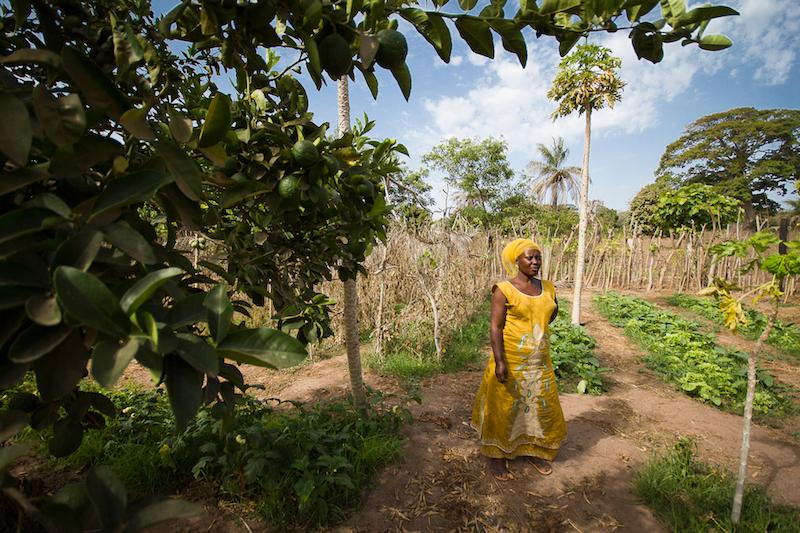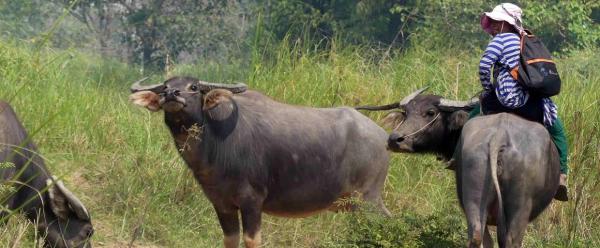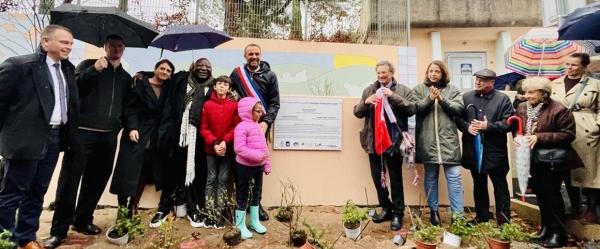- Home
- Press area
- Press releases
- agroecology Senegal public policy
Senegal: getting to work on the agroecological transition

A market gardener from Casamance in her horticulture plot combining fruit trees (citrus, mangoes, papayas) and market garden crops (onions, cabbages, bitter aubergine, etc.). This type of system uses water efficiently: every drop of irrigation water not used by the crops feeds the roots of the trees © R. Belmin, CIRAD
Since May 2019, nongovernmental organizations, farmer organizations, research establishments, multi-stakeholder platforms, consumer associations and pioneering elected representatives have been working on a policy dialogue with the State, focusing on the agroecological transition, following President Macky Sall's declaration that agroecology was now a priority.
Following the Journées de l’Agroécologie in Dakar, attended by 400 people, the Dynamique sur la Transition Agroécologique au Sénégal (DyTAES) handed the Minister of the Environment and Sustainable Development, Abdou Karim Sall, a report entitled "Contribution aux politiques nationales pour une transition agroécologique au Sénégal" (Contribution to national policy for an agroecological transition in Senegal). The report includes a diagnosis of the current situation of agriculture in Senegal, and makes a set of policy recommendations for the country's agroecological transition. Some twenty experts from structures belonging to DyTAES were involved in drafting the report, coordinated by CIRAD.
An unprecedented consultation of rural stakeholders in Senegal
To produce its report, DyTAES consulted more than a thousand stakeholders and visited around thirty sites in the six geographical zones in Senegal (Casamance, Niayes, eastern Senegal, groundnut basin, Ferlo, and river valley). For each zone, the team made a diagnosis of the major issues in terms of agriculture , livestock production, rural development and food security.
The diagnosis pinpointed 15 main challenges for agriculture: support for agriculture; food security and sovereignty; access to land; attractive jobs for young people; product promotion; protection of water resources; land protection and restoration; sustainable forest resource management; access to pastoral resources; sustainable management of fishing resources; protection of local agro-biodiversity; resilience to climate change; synergies between crop and livestock farming; reducing dependence on pesticides and fertilizers; and sustainable consumption.
This comprehensive survey served to highlight twenty-six promising agroecology initiatives such as one by women producers (see photo) associating fruit tree growing (citrus, mango, papaya) and market gardening (onions, cabbages, African eggplants, etc). Local stakeholders were also asked for their policy recommendations (see photos). "This is the first such extensive survey of the agricultural sector in Senegal", says CIRAD's Raphaël Belmin, who was involved in the consultations and coordinated the drafting of the DyTAES report.
The document sets four main objectives :
- Improve and secure production bases (natural resources, seeds, biodiversity, etc)
- Boost productivity (for instance by facilitating access to organic inputs or quality planting material) and agro-silvo-pastoral and fishing production operations in a sustainable way
- Promote the products of agroecology within value chains
- Improve governance and funding of a large-scale agroecological transition.
For the short term, the report pinpoints three priorities for upscaling in terms of agroecology:
- Establish a framework for national multi-stakeholder dialogue to build a national agroecological transition policy integrating the objectives set by DyTAES
- Encourage and provide financial support for experiments on a municipal or departmental scale, in which stakeholders work together to design and implement a territorial plan for agroecological transition
- Pinpoint and implement immediate measures capable of leveraging the agroecological transition (eg subsidizing biofertilizers and biopesticides, cutting the price of productive water, supporting assisted natural regeneration strategies).
A favourable national political context
The DyTAES report coincides with a period of agricultural transition in Senegal. The agroecological transition, which has the support of the President of the Republic of Senegal, is one of the five major initiatives of the priority action plan for the second phase of the Plan Sénégal Emergent (2019-2024). Increasingly severe climate hazards, strong population growth and the adverse environmental consequences of the Green Revolution mean that it is necessary to take a fresh look at agricultural development strategies and foster more sustainable practices. "All the conditions are right for Senegal to show other countries the way in terms of agroecology" , says Mariam Sow, Executive Secretary of ENDA Pronat and member of DyTAES.
Senegal is spearheading agroecology in West Africa FAO chose Senegal in 2015 as a pilot country in terms of agroecology, and since then, it has been privileged site for agroecology projects driven by the Economic Community of West African States. Since 2017, international and regional players, such as the Alliance pour l’Agroécologie en Afrique de l’Ouest (‘3AO’), have stepped up their commitment to agroecology. Through the Ouagadougou Declaration and several regional projects (eg Desira initiative, territorial One Health project), political spheres, donors and the agricultural research sector have expressed their intention to work together in the Sahel on agroecological practices and values. |
Sarah Toumi, member of the Conseil Présidentiel pour l’Afrique, showed her support of agricultural stakeholders in Senegal by participating in the Journées de l’agroécologie from 30 January to 1 February.



























